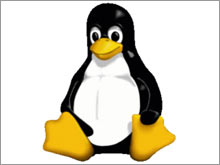|
Can Linux help Oracle beat IBM?
Oracle is duking it out with IBM for database market share, but Linux put Oracle over the top this year.
SAN FRANCISCO (Business 2.0 Magazine) - For years, Oracle and IBM have fought over bragging rights for the $8 billion database software market - a key technological battleground upon which sales of almost all other business software depend. Linux as a competitive edge
Now Oracle (Research) seems poised to gain an edge in that battle, thanks to years of work spent adapting its software for Linux.
On Tuesday, Oracle announced it was donating file-clustering technology to the Linux open-source project, a contribution meant to help make Linux a better operating system for running large databases. That's just the most recent investment Oracle has made in Linux. In its biennial survey of the world's largest databases, WinterCorp, a database research and consulting company, reported that Oracle dominated its list of 175 large databases. For the first time, databases running on Linux appeared on WinterCorp's list -- and all of them came from Oracle. While Oracle and IBM (Research) don't break out database sales in their quarterly results, the research firm Gartner estimates that the companies were neck-and-neck in overall sales for 2004, the most recent figures for which figures are available. Analysts are split on who will win the next market-share battle, but the answer may key on the growth of Linux. In Gartner's survey, almost 60 percent of respondents plan to move their databases to Linux. That stands to reason: The hardware savings alone are staggering. Indeed, Jefferies & Company analyst Robert Schwartz believes that Oracle will take share from IBM and outpace the rest of the database market precisely because of the growth of Linux. Jim Meredith, manager of information systems at tableware retailer Replacements Ltd., says he spent $218,000 to buy a Sun (Research) server four years ago that he has now replaced with four H-P (Research) Linux servers, which cost him $55,000 in total. Meredith is running a version of Oracle's database designed to run across multiple servers. That's a key change from Oracle's older database software, which was designed to run on a single large, expensive server. Wooing the Linux community
Oracle started a project six years ago to adapt Linux to large servers. At the time, Linux didn't handle the swapping of large chunks of data well, a flaw which made databases running on Linux unacceptably slow. So, Oracle assigned a team of engineers to the task of improving Linux's performance, and now offers technical support on the operating system to customers running its database and other software on Linux systems. IBM, of course, isn't standing still. Databases are typically used in conjunction with other software, and it's been pushing hard to make its DB2 database software work well with products from other software vendors ranging from Adobe (Research) to SAS. IBM's most important software partner, of course, is SAP, which is Oracle's archrival in the business-application software market. When SAP (Research) sells business applications, it typically recommends IBM's database to go with it. Oracle prefers to sell its own database alongside its business applications, though its software can run with IBM's database. Can Oracle come out on top in Gartner's next survey? Consider that in the last survey, sales of databases for Linux jumped 118 percent -- far outpacing the sales of databases for Windows and Unix. And Oracle had more than 80 percent of the $655 million Linux database market.
If those trends continue, Oracle looks set to take the database crown this year. |
|

